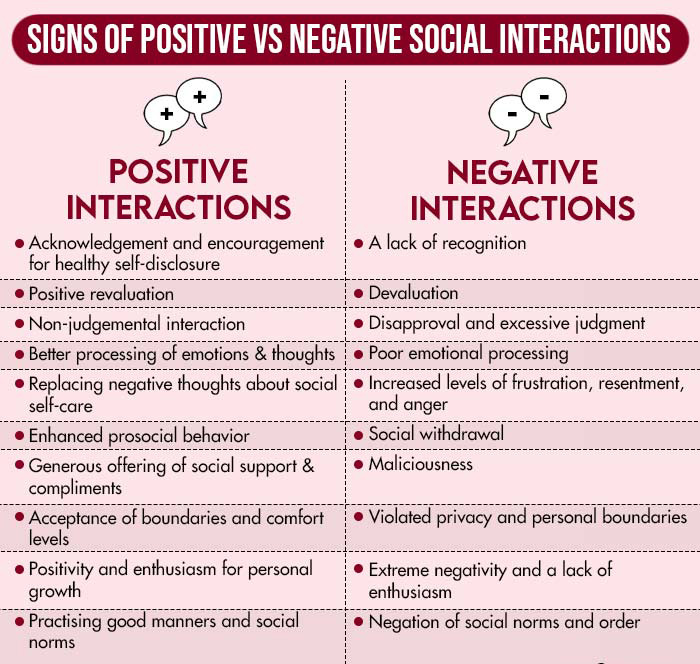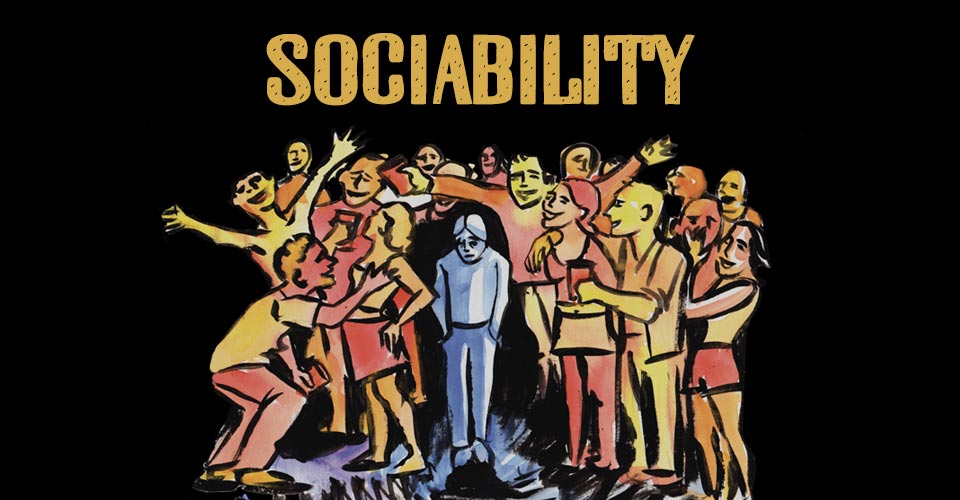Sociability is a person’s quality to be social and interact with others in social situations. It is also used as an umbrella term to describe social ambiance and interpersonal correspondence in face-to-face as well as digital environments.
What Is Sociability?
Sociability is popularly defined as the tendency to seek social interactions and companionship, participate in social activities, and engage in interpersonal relationships. In psychology 1 Kaidanovich-Beilin, O., Lipina, T., Vukobradovic, I., Roder, J., & Woodgett, J. R. (2011). Assessment of social interaction behaviors. Journal of visualized experiments : JoVE, (48), 2473. https://doi.org/10.3791/2473 , it is a notion used to describe particular interpersonal bonds and apprehend different forms of social connections.
Sociability in personality traits
When considered a personality trait, sociability involves a positive, socially valued behavioral trait that fosters social connectedness.
People with this personality type display empathy, self-control, adaptability, integrity, friendly and outgoing dispositions, and team spirit. In some people, sociability is an innate personality trait 2 Bralten, J., Mota, N. R., Klemann, C. J. H. M., De Witte, W., Laing, E., Collier, D. A., de Kluiver, H., Bauduin, S. E. E. C., Arango, C., Ayuso-Mateos, J. L., Fabbri, C., Kas, M. J., van der Wee, N., Penninx, B. W. J. H., Serretti, A., Franke, B., & Poelmans, G. (2021). Genetic underpinnings of sociability in the general population. Neuropsychopharmacology : official publication of the American College of Neuropsychopharmacology, 46(9), 1627–1634. https://doi.org/10.1038/s41386-021-01044-z ; in others, it can be developed over time.
Read More About Empathy Here
Sociability in the workplace
Sociability in the workplace 3 Sigursteinsdottir, H., & Karlsdottir, F. B. (2022). Does Social Support Matter in the Workplace? Social Support, Job Satisfaction, Bullying and Harassment in the Workplace during COVID-19. International journal of environmental research and public health, 19(8), 4724. https://doi.org/10.3390/ijerph19084724 is a highly valued trait, especially in job roles that require team leadership. People with this trait display good communication and negotiation skills, self-motivation, self-management, sound decision-making skills, and personal responsibility.
They are also very proficient in conflict management, knowing how to effectively navigate workplace disputes 4 Daniels, K., Watson, D., & Gedikli, C. (2017). Well-Being and the Social Environment of Work: A Systematic Review of Intervention Studies. International journal of environmental research and public health, 14(8), 918. https://doi.org/10.3390/ijerph14080918 and resolve disagreements.
They encourage team participation through compromise and cooperation and are very good at achieving group unity and goals. Most highly sociable persons, in fact, go on to take leadership roles within organizations.
Read More About Leadership Here
How Does Mental Health Relate To Socialization?
Our social relationships and health are closely intertwined. Research 5 Ford, E. S., Ahluwalia, I. B., & Galuska, D. A. (2000). Social relationships and cardiovascular disease risk factors: findings from the third national health and nutrition examination survey. Preventive medicine, 30(2), 83–92. https://doi.org/10.1006/pmed.1999.0606 shows that the benefits of socializing lie in reducing risks of cardiovascular and coronary diseases as well as mortality. It also boosts our immunity and enhances our life expectancy.
Studies also affirm the positive effect of social interaction on mental health. Positive social interactions are associated with elevated mood, better cognitive functioning, greater prosocial behavior, improved memory, and sound self-monitoring.
However, poor mental health is linked to low scores of sociability. Several neuropsychiatric disorders like depression, autism, and schizophrenia result in altered sociability.
Mental health disorders often cause the dysfunctional release of certain neuropeptides 6 Caldwell H. K. (2012). Neurobiology of sociability. Advances in experimental medicine and biology, 739, 187–205. https://doi.org/10.1007/978-1-4614-1704-0_12 that regulate sociability, like oxytocin and vasopressin. People suffering from such psychological conditions tend to display tendencies like social withdrawal, self-imposed isolation, avoidant behavior, and anhedonia.
Mental health and social networks
The mental health benefits of social interaction are immense. Social networks act as social support systems 7 Greenblatt, M., Becerra, R. M., & Serafetinides, E. A. (1982). Social networks and mental health: on overview. The American journal of psychiatry, 139(8), 977–984. https://doi.org/10.1176/ajp.139.8.977 to promote mental health and buffer psychological stress 8 Shin, Y. J., & Shin, N. S. (2017). Relationship between sociability toward humans and physiological stress in dogs. The Journal of veterinary medical science, 79(7), 1278–1283. https://doi.org/10.1292/jvms.16-0403 in the face of negative events.
Family and friend interactions provide greater self-esteem, positivity and enthusiasm, and a greater sense of belonging. Studies show that the help, guidance, and affection of these social connections help both the giver and the receiver.
However, loss of social connections is associated with poor mental well-being, especially in the elderly. The older population’s inability 9 Singh, A., & Misra, N. (2009). Loneliness, depression and sociability in old age. Industrial psychiatry journal, 18(1), 51–55. https://doi.org/10.4103/0972-6748.57861 to participate in social activities is influenced by several factors like loneliness, disability, a loss of connection with their culture of origin, and low sociability.
With advancing age, as they lose connection with their existing friendship networks, they find it difficult to initiate new social relationships and adjust to unfamiliar social circles.
Falling out of place, they tend to withdraw themselves socially and even take to self-imposed isolation. Consequently, they tend to develop a wide range of mental health conditions 10 Meyer, R. P., & Schuyler, D. (2011). Old age and loneliness. The primary care companion for CNS disorders, 13(2), e1–e2. https://doi.org/10.4088/PCC.11f01172 , such as:
- Depression [Read more]
- Social anxiety [Read more]
- Psychosis [Read more]
- Avoidant personality disorder [Read more]
- Diogenes syndrome (DS)
- Dementia, etc. [Read more]
Social Media, Social Interaction, And Mental Health
In this new digital age, sociability and social interaction have shifted online as well, to social media platforms. While it is argued that social media enhances scores of social interaction and decreases isolation, excessive social media use can trigger mental health conditions, namely, Internet usage disorder, social media addiction, and doomscrolling.
Research 11 Hasan, S., Crocker, R., Rousseliere, D., Dumont, G., Hale, S., Srinivas, H., Hamilton, M., Kumar, S., Maclean, C., Bauer, H., Opstal, W., Mueller, C. von, Waters Robichau, R., von Schnurbein, G., Archambault, E., Anheier, H. K., Mukerji, M., Borkman, T., Jung, R. H., & Das, A. (2010). Sociability. International Encyclopedia of Civil Society, 1376–1379. https://doi.org/10.1007/978-0-387-93996-4_598 further shows that unhealthy use of social media and negative social media interactions can trigger several mental health disorders and disabilities (in children, adolescents, and young adults) like:
- Self-esteem issues [Read more]
- Depression [Read more]
- Anxiety [Read more]
- Fear of missing out (FOMO) [Read more]
- Syndromes like ringxiety, selfitis, etc.
- Isolation and loneliness [Read more]
- Body dysmorphia
- Eating disorders [Read more]
- Substance use disorders
- Sleep disorders [Read more]
Sociability Vs Social Skills
Sociability and social skills are distinct character traits. Sociability is popularly defined as the tendency to seek social interactions. It is a personality trait and is generally hard-wired into people.
On the other hand, social skills are certain skills employed to communicate and interact with others, both verbally and non-verbally, in social situations. These skill sets are not innate characteristics but can be learned and even improved over time.
Sociability and social skills are not mutually exclusive. Someone with a high degree of sociability sans good social skills may be driven to interact with others but he/she may not necessarily do it effectively because of a lack of adequate skills.
However, an individual with low sociability but cultivated social skills may find it easy to navigate social situations, despite lacking the drive to connect with others and participate socially.
Social Person Vs Sociable Person
The terms “social person” and “sociable person” may sound similar, but these have subtle differences. A “social person” is someone who actively seeks out social interactions. He/she may have a large network of friends and acquaintances. Such is generally seen as outgoing, friendly, and able to navigate social situations with ease.
Contrarily, a “sociable person” is someone who is willing to seek or enjoy companionship and form pleasant social relations when the opportunity arises. He/she may not necessarily seek out social situations, yet he/she is still able to participate in them, thanks to good social skills.
Positive And Negative Social Interactions
The predominant additive or direct effects model of sociability 12 Lincoln K. D. (2000). Social Support, Negative Social Interactions, and Psychological Well-Being. The Social service review, 74(2), 231–252. https://doi.org/10.1086/514478 categorizes social interactions into positive and negative ones. Both positive and negative social interactions have additive effects on psychological well-being.
While positive and healthy interactions have a beneficial impact on well-being, negative and unsupportive social interactions have a harmful impact.
Positive social interactions highlight the importance of social relationships in fostering group support, empathy, and cohesiveness. Whereas, negative social interactions bring hurt, distress, sadness, isolation, rejection, and unpleasantness. These aspects result in reduced psychological and physical well-being.

How To Become A More Sociable Person
Consider the following measures to become a more sociable person:
- Be genuine and have welcoming body language.
- Tackle your reservations and let go of your fear of social rejection. Consider prioritizing your social life too.
- Be confident in who you are and avoid excessive self-monitoring in social situations.
- Don’t compartmentalize 13 Tang, A., Beaton, E. A., Schulkin, J., Hall, G. B., & Schmidt, L. (2014). Revisiting shyness and sociability: a preliminary investigation of hormone-brain-behavior relations. Frontiers in psychology, 5, 1430. https://doi.org/10.3389/fpsyg.2014.01430 your life. Step outside your comfort zone when it comes to making friends or having conversations.
- Honor invitations to parties, work or family gatherings, and other social events.
- Try to socialize with people at work. Create friendship bonds with acquaintances and build on older bonds.
- Read social cues and steer conversations according to the social situation. Ask easy-to-answer questions and bring up engaging topics.
Takeaway
For people to whom sociability doesn’t come easy, navigating a social situation can be particularly difficult. Because sociability is a socially valued, positive trait, it is recommended that one should work on his/her social skills to interact more positively with others.
It is a well-known fact that positive socialization benefits mental and physical health and, therefore, such fulfilling interactions can help one enjoy a happier, more fulfilling life.
At A Glance
- Sociability is popularly defined as the tendency to seek social interactions and companionship.
- It is also a positive, socially valued personality trait.
- In the workspace, it is a valuable trait in leadership and fostering group culture.
- Sound social connections and mental health are closely connected.
- Sociability is associated with fulfilling interpersonal relationships, happiness, and greater life satisfaction.
Frequently Asked Questions (FAQs)
1. What is a social personality type?
Personality and sociability are closely related. A person with a social personality type usually cares about the well-being of others, shows leadership qualities, and tends to love social interaction.
2. What is the synonym of sociability?
Sociability has numerous synonyms, including, affability, agreeability, agreeableness, amenity, amiableness, etc.
3. Is sociability a quality?
Sociability or the quality or state of being sociable is considered a valuable trait in leadership.
4. Why is sociability important for a leader?
A group leader’s sociability may increase motivation, productivity, creativity, and freedom of expression. It can also make the leader appear more relatable and approachable and reduce stress for the followers or subordinates.
5. What are sociability and solidarity?
Sociability is a measure of sincere friendliness among members of a community. Solidarity compliments sociability, in that it measures a community’s united ability to pursue shared objectives, regardless of personal ties.
6. What are sociability traits?
People with sociability traits are often friendly, outgoing, courteous, tactful, and diplomatic.
7. What are some common sociability tests?
Common sociability tests include the Three-Chamber Sociability and Social Novelty Test, the Five-Trial Social Memory Test, the Two-Trial Social Memory Test, the Ultrasonic Vocalization Test, etc.















